 |
Picks is a monthly sampling of Japan's art scene, offering commentary by a variety of reviewers about current or recent exhibitions at museums and galleries around the country.
Note: With the relaxation of the government's emergency measures to minimize the spread of the coronavirus, most museums in Japan have reopened, but many still require reservations. If you are planning a visit, please check the venue's website beforehand. |
 |
 |
|
|
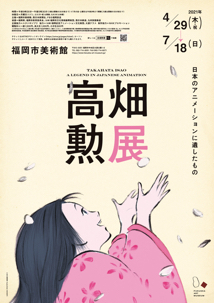 |
 |
 |
 |
| Takahata Isao: A Legend in Japanese Animation |
| 29 April - 18 July 2021 |
Fukuoka Art Museum
(Fukuoka) |
 |
| The work of Takahata (1935-2018) opened up new possibilities for Japanese animation and had an indelible impact on animators everywhere. This retrospective introduces his acclaimed oeuvre, including such masterworks as Grave of the Fireflies and The Tale of the Princess Kaguya, through a wealth of documentation -- production notes, storyboards, original drawings, cels, videos. The inclusion of previously unreleased materials casts further light on how Takahata's stringent production standards propelled advances in Japanese animation and influenced other works in the genre.
|
|
|
 |
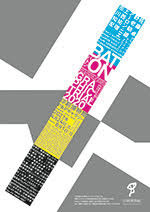 |
 |
 |
 |
| Graphic Trial 2020: Baton |
| 24 April - 1 August 2021 |
Printing Museum, Tokyo
(Tokyo) |
 |
| The Graphic Trial project explores new expressions in print media through collaborations between leading creators and the museum's owner, Toppan Printing. Held annually since 2006, the exhibition resumes now after cancellation last year due to the coronavirus pandemic. The theme of this year's "trial" is the baton, signifying the relaying of ideas among creators as well as to future generations. The five participants -- graphic designer Taku Satoh, artist Asao Tokolo, art directors Aaron Nieh and Yuri Uenishi, and Toppan photographer Tomohiro Ichikawa -- are particularly appropriate choices for an Olympic year. |
|
|

|
 |
 |
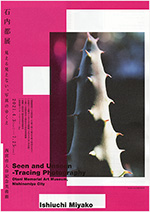 |
 |
 |
 |
| Ishiuchi Miyako: Seen and Unseen - Tracing Photography |
| 3 April - 25 July 2021 |
Otani Memorial Art Museum, Nishinomiya City
(Tokyo) |
 |
| The significance of holding a retrospective of a still-active artist is to be found in its capacity to present an artist's core in concentrated form, while at the same time showing new territory they are now exploring. This compact exhibition satisfies in both respects by demonstrating how images like Ishiuchi's startling new series The Drowned highlight the paradoxical ability of photography, a medium of surfaces, to express layers of time through the scars it reveals on those surfaces. Also central to her work is the cool yet empathetic eye she casts on the damage inflicted on women's bodies, conveyed through such metaphors as cast-off clothing, flower petals and plants. See this month's Focus for a detailed review. |
|
|
 |
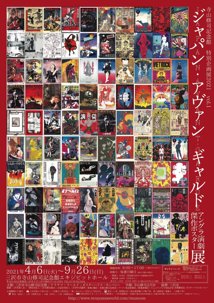 |
 |
 |
 |
| Japan Avant-garde |
| 6 April - 26 September 2021 |
Shuji Terayama Museum
(Aomori) |
 |
|
In the 1960s and 70s, Japanese playwrights like Shuji Terayama and Juro Kara staged experimental underground-theater productions that upended the tropes of conventional Western-style drama and resonated with the worldwide rebellion of youth against the established order. These were promoted through posters whose innovative visuals formed a powerful synergy with the on-stage spectacles as well as serving as calling cards for the theater troupes. This show examines the role of posters as a tool not only for publicizing the world of avant-garde theater but also actively energizing it.
|
|
|
|
|
|
|
|

|
 |
 |
|
 |
 |
 |
 |
| Kazuki Yasuo: A Retrospective |
| 3 July - 5 September 2021 |
The Miyagi Museum of Art
(Miyagi) |
 |
|
Yamaguchi-born Kazuki (1911-74) was a painter initially known for his limpid colors and sentimental lyricism. Drafted into the army and taken prisoner at the end of World War II, he survived the horrific conditions in a Siberian labor camp where many of his comrades perished. After repatriation in 1947 he returned to his hometown and worked on his Siberia Series of paintings depicting his experiences as a prisoner of war, completing 57 such works before his death at 62. Kazuki's stark portrayals of suffering under extreme conditions, of prayers for the dead and yearning for home, and of the harsh but stunning beauty of nature continue to shock and move viewers. This is the first time the entire series has been exhibited in northeastern Japan.
|
|

|
 |
 |
 |
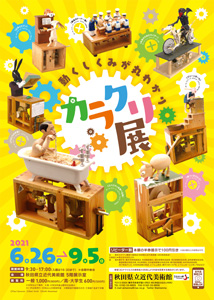 |
 |
 |
 |
| Karakuri: How Automata Work |
| 26 June - 5 September 2021 |
Akita Museum of Modern Art
(Akita)
|
 |
| Automata -- mechanisms that engage in lifelike movements when you turn a handle -- have a long history in Japan, where they are known as karakuri. Typically built of wood, metal bars and belts, automata are relatively simple devices, but just how does the motion of turning a crank get converted into all those complex actions? Accompanying the 140 automata on display here are models, documents and other materials that reveal the secrets of these fascinating gizmos. |
|
|
 |
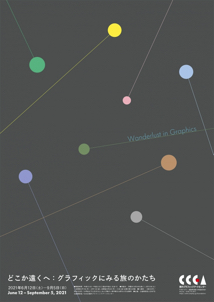 |
 |
 |
 |
| Wanderlust in Graphics |
| 12 June - 5 September 2021 |
Center for Contemporary Graphic Art (CCGA)
(Fukushima) |
 |
| A selection of posters from the DNP Graphic Design Archives at CCGA that relate to "travel in the broadest sense." Per the gallery website: "Travel encompasses numerous elements, such as modes of transportation, destinations, and experiences acquired where we travel. In the advertising field, many works deal with transportation or promote specific tourist attractions; and even today, when fewer posters are created than earlier, we can still find graphics of these kinds. Visitors to the gallery, upon seeing these works relating to travel expressed through graphic design, are sure to get a sense of our endless human quest to roam -- our wanderlust." |
|
|
|
|
|
|
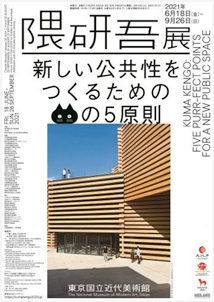 |
 |
 |
 |
| Kuma Kengo: Five Purr-fect Points for a New Public Space |
18 June - 26 September 2021 |
The National Museum of Modern Art, Tokyo
(Tokyo) |
 |
| The show's curious title derives from a research project by the celebrated architect that "reinterprets the urban environment from the perspective of cats." To quote further from the museum's description: "This exhibition features 68 designs selected from among Kuma's projects worldwide, with a focus on those of a highly public nature, categorized according to five principles that Kuma has conceived -- 'hole,' 'particles,' 'oblique,' 'softness,' and 'time' -- and presented in the form of models, photographs, and mockups. Another 74 exhibits, including video works and a mobile home displayed in front of the museum, will immerse viewers in Kuma's vision."
|
|
 |
|
|
|
 |
|